End-to-end SDK generation and publishing with GitLab Pipelines
Supported SDK languages:
| TypeScript / Javascript | Java / Kotlin | Python | C# | Go | PHP |
|---|---|---|---|---|---|
| ✅ | ✅ | ✅ | ✅ | ✅ | ✅ |
This tutorial shows you how to use GitLab pipelines with liblab to automate the SDK generation and publishing process for an existing project. You'll learn how to configure CI/CD workflows that automatically generate and release SDKs to public package managers like npm, PyPI, NuGet, Maven, Go Packages, and Packagist.
Ensure that you:
- Have a working liblab project with a valid OpenAPI spec and
liblab.config.jsonfile. - Have an account on the package management platform(s) you want to deploy your SDKs to (ex. NPM, PyPi, Maven). This guide will help you with all of the other deployment details.
If you're new to GitLab pipelines, you can find more information in the CI/CD pipelines documentation.
This guide doesn't cover setting up a new liblab SDK project.
If you don't have a liblab SDK project yet then you'll first want to follow one of our framework guides or general getting started guide.
Structural Overview
Your completed project will consist of:
- Your existing liblab project repository which we'll refer to as the "Control Repo"
- One SDK repository per SDK language you want to publish which are your "SDK Repos"
When you complete the tutorial, the project repository structure will look like the example below.
Where each SDK repo will have the following organization:
- TypeScript
- Python
- C#
- Java
- Go
- PHP
Any change to the API spec or liblab configuration in the Control Repo will trigger SDK builds and create pull requests (PRs) in the respective SDK repositories.
Set up the Control Repo
First, you'll need to set up your GitLab pipeline. Run the following command from the root of your project:
cd your-liblab-project
curl --create-dirs --output .gitlab-ci.yml https://raw.githubusercontent.com/liblaber/control-repo-template/refs/heads/main/.gitlab-ci.yml
This command downloads the official liblab Bitbucket pipeline file (.gitlab-ci.yml) and places them in the root of your Control Repo.
.gitlab-ci.ymlThis file automates the SDK generation process and creates pull requests for changes in specific files, such as liblab.config.json and directories like hooks and customPlanModifiers. It triggers on pushes to the main branch or manual web actions to execute the build. You can customize it as needed.
This is what you should have so far:
Create SDK Repos
Each generated SDK lives in its own repository, one per SDK language. Therefore, you need to create a new repository for each SDK language you plan to publish. In each repository, you must include a CI/CD configuration file (.gitlab-ci.yml) to ensure the SDK is automatically published to the correct package manager always it's updated.
You don’t need to write the pipeline configuration yourself, we’ve already done that for you. Use the links below to access the most up-to-date .gitlab-ci.yml files from the official liblab SDK template repositories:
This is what you should have so far:
Create liblab and GitLab tokens
The GitLab CI/CD pipeline in the Control Repo requires two secrets to generate SDKs:
- A liblab token for authenticating the liblab CLI.
- A GitLab access token to let the liblab CLI to push to your SDK repos.
Create a liblab token
By default, this token will expire after 90 days. You can increase this to up to 364 days by passing the --durationInDays parameter.
Read more on the liblab token command in the CLI documentation.
For guidance on setting up variables in GitLab, refer to the GitLab CI/CD variables documentation.
To generate a liblab token, run the following command from your terminal:
liblab token create LIBLAB_TOKEN
You can replace LIBLAB_TOKEN with any name you prefer. If you're generating SDKs for multiple APIs, you can either share the token between them or create separate tokens for each API.
Token successfully generated, it will be valid for 90 days
-TOKEN-----------------------------------------
liblab_HYeJzYb5CO3t7JaW4I6ZWKNKbOGp01MqqYSTS6yG
-----------------------------------------------
Copy the token (e.g., liblab_HYeJzYb5CO3t7JaW4I6ZWKNKbOGp01MqqYSTS6yG) and save it somewhere safe. The token will allow liblab to authenticate during the CI/CD pipeline run. Then, add the token to your Gitlab Control Repo project:
- Access your GitLab project.
- Navigate to Settings > CI/CD > Variables and click Add variable.
- For Key, use
LIBLAB_TOKENand paste the liblab token into the Value field and click Add variable.
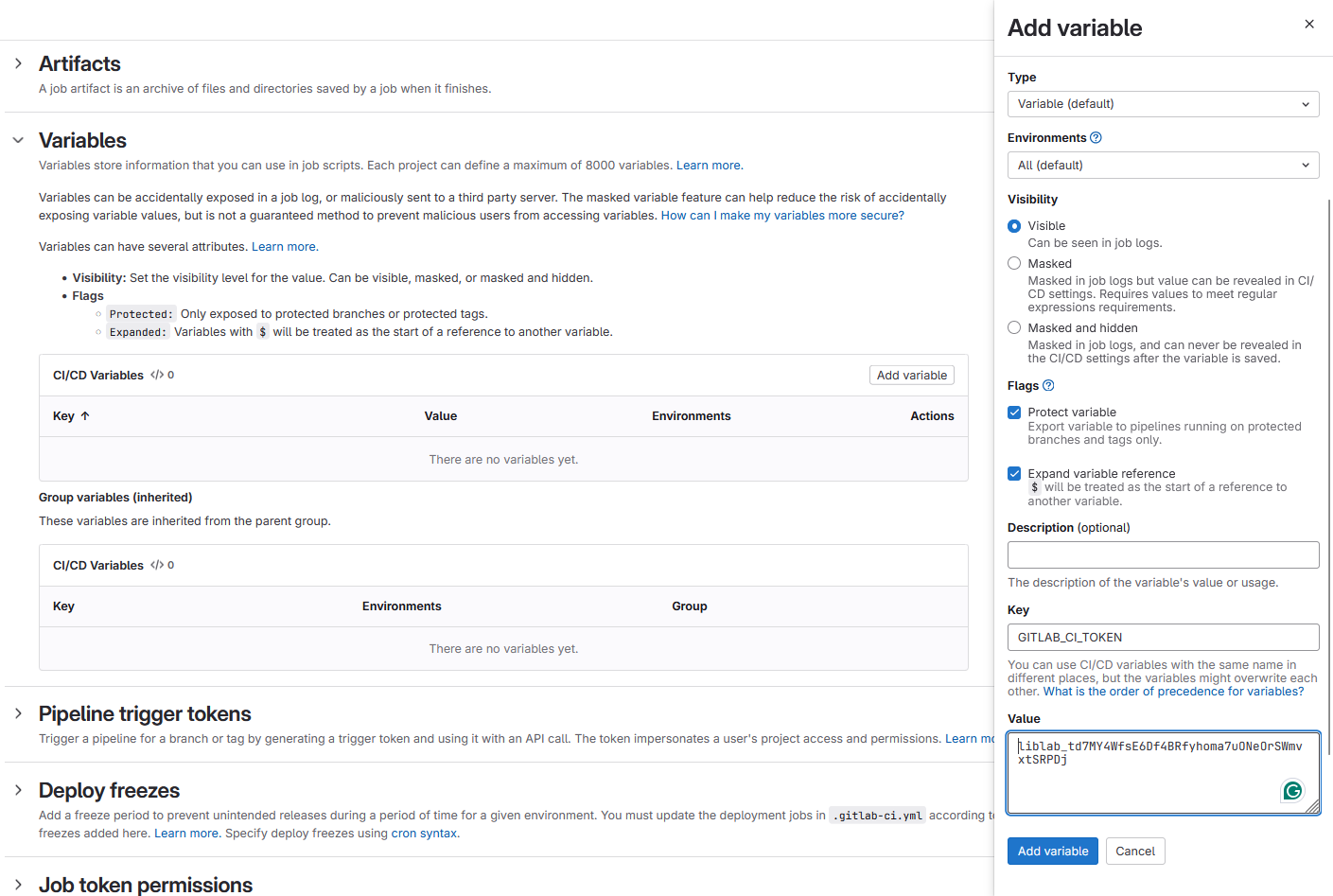
Create a GitLab access token
To enable the GitLab pipeline to run the liblab CLI and push changes to your SDKs repos, you need to generate a GitLab personal access token:
-
In GitLab, click at your profile picture and select Preferences.
-
Access the Access tokens tab from the sidebar.
-
Select Add new token.
-
Enter a name (e.g.,
liblab-token) and an expiration date based on your organization's security policy.tipIt's helpful to create a reminder for yourself such as a calendar item to refresh your liblab and GitLab tokens just before they expire!
-
Select the following scopes:
- api
- read_repository
- write_repository
- read_user
-
Select Create personal access token and copy the generated token. This token will be used to authenticate and push SDKs to your SDK repos.
-
Add this token to your GitLab project's Settings > CI/CD > Variables as
LIBLAB_GITLAB_TOKEN.

This is what you should have set up so far:
Create package manager tokens
Depending on what SDK language you are using, you will need to create additional secrets.
- TypeScript
- Python
- C#
- Java
- Go
- PHP
To publish to npm, you will need an npm access token. You can generate a new access token from your user settings on npm.
-
Select the Access Tokens tab, drop down the Generate New Token button, then select Granular Access Token.

-
Fill in all the required details for the token such as the name and expiry.
-
Make sure that this token has read and write permission to publish packages. If the package already exists, you can scope this token to just that package, otherwise this token needs read and write for all packages.
-
Once the token has been created, make a copy of it.
-
In your TypeScript SDK repo, add this token as an Actions secret named
NPM_TOKEN.
You can learn more about creating npm tokens in the npm access tokens documentation.
To publish to PyPI you will need an API token. You can generate a new API token from your account settings page on PyPI.
-
Select Account settings, scroll to the API tokens section, then select the Add API token button.
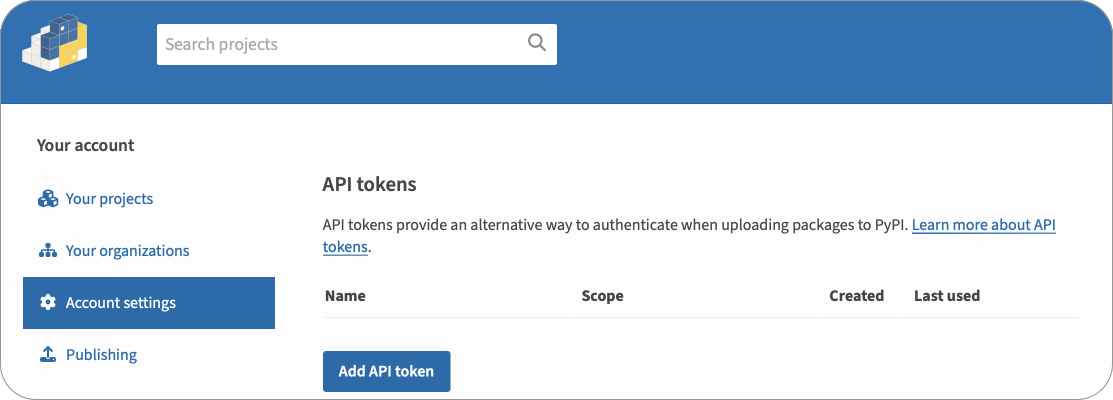
-
Give the token a name.
-
Select the scope for the token. If the package already exists, select that package for the scope, otherwise select Entire account (all packages).
-
Select the Create token button.
-
Once the token has been created, make a copy of it.
-
In your Python SDK repo, add this token as an Actions secret named
PYPI_TOKEN.
You can learn more about creating PyPI tokens in the PyPI API tokens documentation.
To publish to NuGet, you will need a NuGet API key. You can generate an API key from your account on NuGet.
-
Select your name on the top right, then select the API Keys.
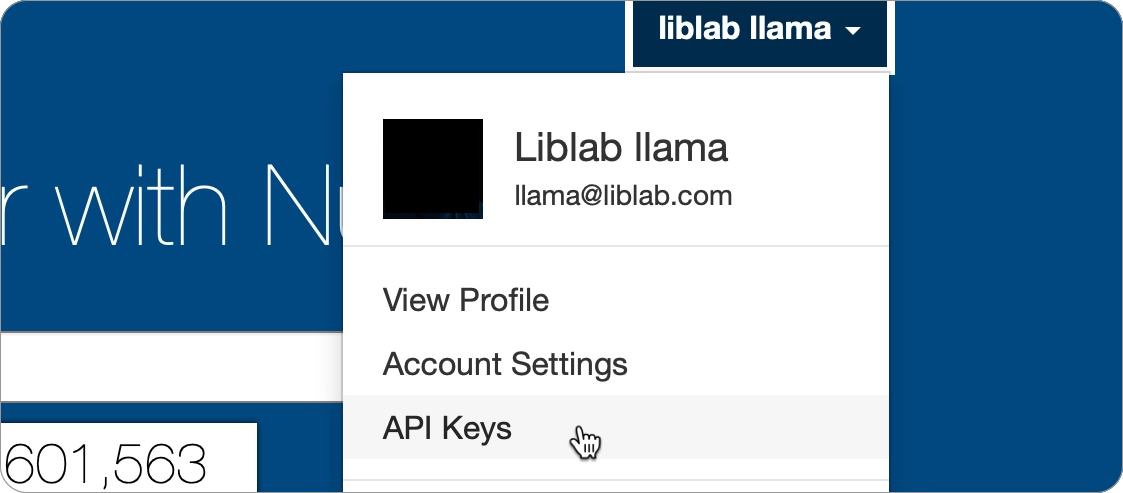
-
From the API Keys page, expand the Create section.
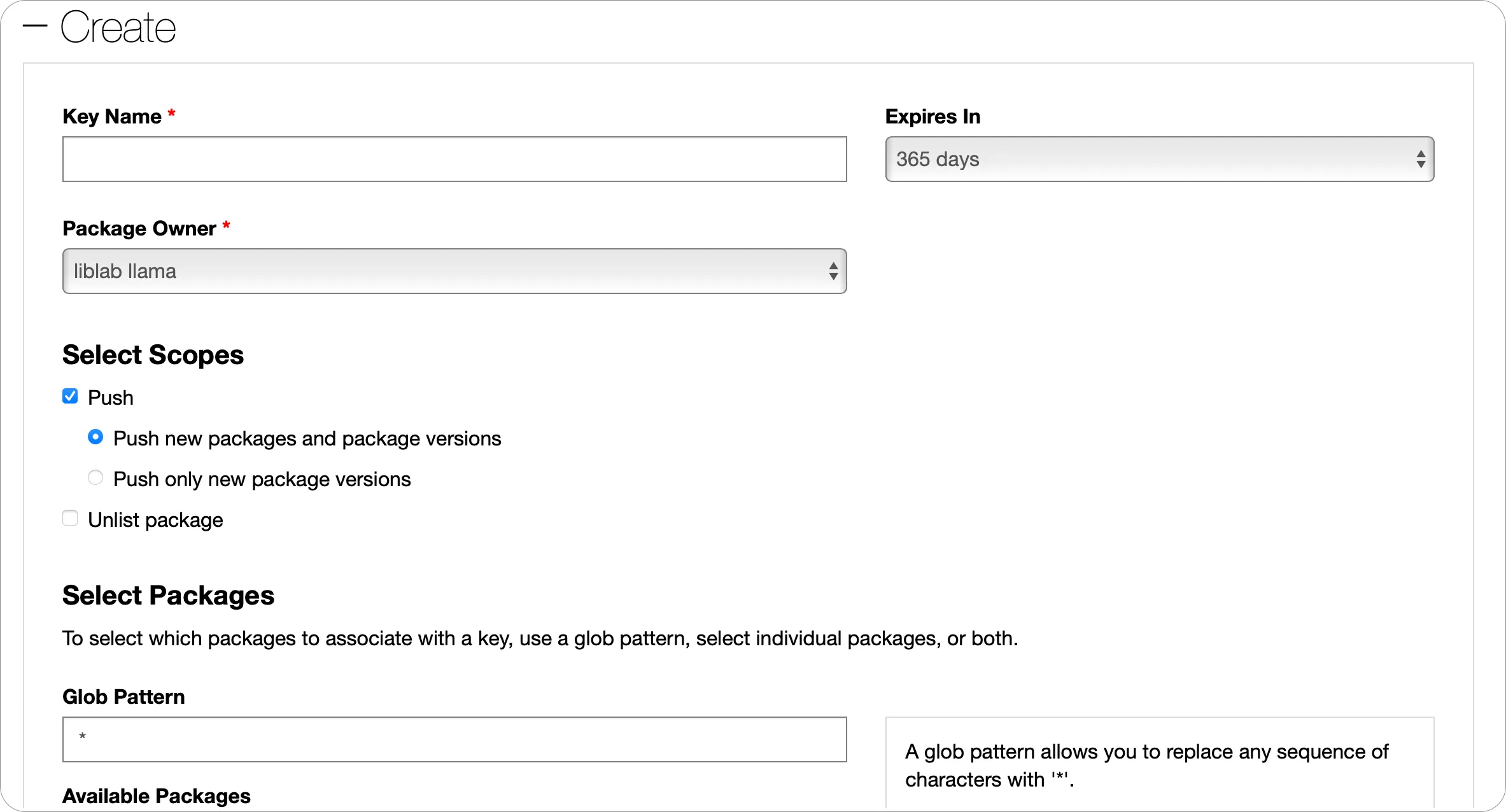
-
Give your API Key a name, and set the required expiry and package owner.
-
Set the scope for this API Key.
- If the package already exists, select Push and Push only new package versions. Then in the Select Packages section, select the package you want to publish updates for.
- If the package does not exist, select Push and Push new packages and package versions, then in the Glob pattern, put
*. This will allow you to push a new package.
-
Select the Create button.
-
Once the API Key has been created, expand the Manage section, and make a copy of it using the Copy button.

-
In your C# SDK repo, add this token as an Actions secret named
NUGET_TOKEN.
You can learn more about creating NuGet API Keys in the NuGet API Keys documentation.
To publish to the Maven Central Repository, you will need Maven credentials and a GPG key with a passphrase to sign your artifacts.
As of March 12th, 2024, the Central Portal became the default publishing server for Maven packages. At the moment, we do not support automatic publishing through the Legacy OSSRH.
Central Portal Setup
The Central Portal Account Documentation explains how to create an account. An account is required for claiming namespaces, generating credentials and managing package deployments.
Namespace Registration
Your namespace is the crucial prerequisite for publishing a package to the Central Repository as it is the groupId of the package. The Central Repository Namespace Documentation provides detailed instructions for claiming a namespace.
The namespace verification process is not instant.
- For own domain namespaces (e.g.
com.liblab), an additional step is required, which involves setting up the verification key as a DNS record in order for the domain name to be verified by the Central Repository. - For GitHub namespaces (namespace in the form of
io.github.githuborgname), though, verification process is automatic if the user is registered using the GitHub SSO.
Once your namespace is verified, the next step is to generate your Maven credentials.
Generate Maven Credentials
-
Head to the Central Portal at central.sonatype.com, and either create an account, or sign in.
-
Select your email on the top right, then select View Account.
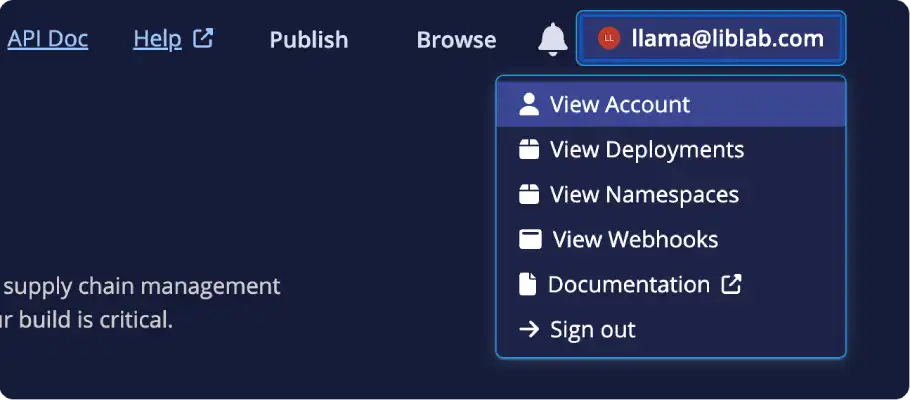
-
From the Account page, select the Generate User Token button.
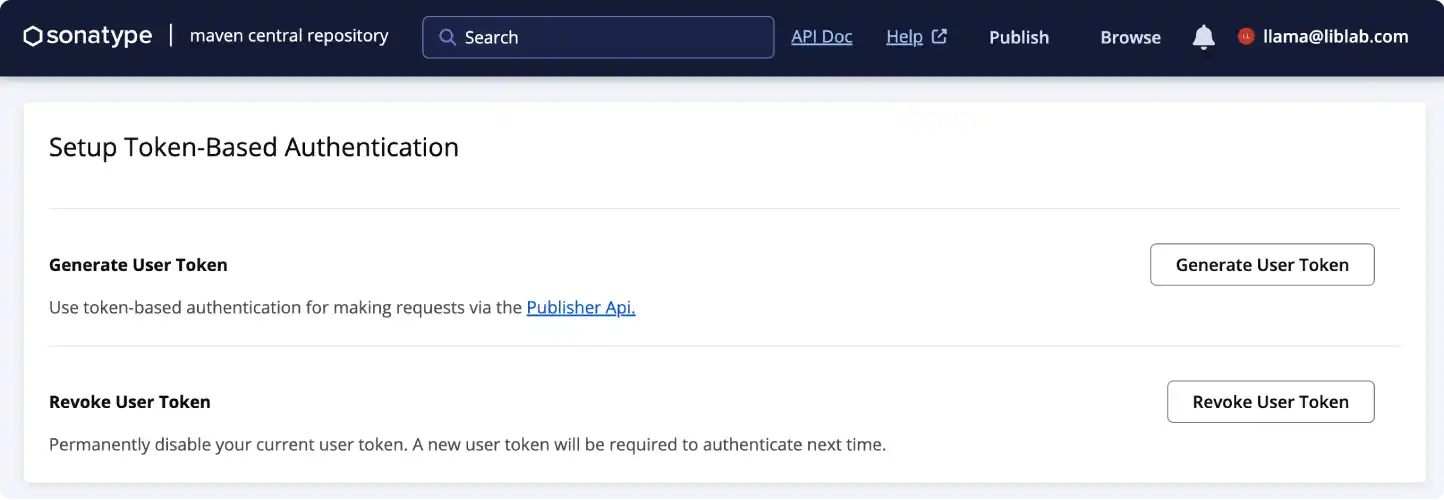
-
When the dialog appears, confirm that you want to generate a new token, and credentials will be generated.
-
In your Java SDK repo, add value of the
Usernamefield as a new GitHub Actions secret calledMAVEN_USERNAMEand the value of thePasswordfield as a secret calledMAVEN_PASSWORD.
You can learn more about creating Central Portal credentials in the Central Portal Documentation.
Generate GPG Key
The Central Repository requires all artifacts to be signed with PGP, such as using a GPG key. You will need to generate your own key pair, distribute it to the key server and obtain the private key, then set this as an other GitHub Actions secret.
The following steps will guide you through the process of creating a GPG key using GnuPG. If you already have a GPG key, you can skip this step. If you want to use a different tool to generate your GPG key, you will need to follow the relevant documentation for that tool.
-
Install GnuPG if you don't have it installed.
-
Initialize the key generation prompt by running:
Terminalgpg --gen-key -
Follow the instructions from
gpg, and choose a passphrase -
Once the key is generated, you will need to get the key id. This is the 40-character hex string on the second line of the
pubsection in the output from generating the key:Terminalpublic and secret key created and signed.
pub ed25519 2024-05-07 [SC] [expires: 2027-05-07]
AB1C2D3456EF78A90BC12D34567890123456789E
uid Exciting Soda <[email protected]>
sub cv25519 2024-05-07 [E] [expires: 2027-05-07] -
Send the key to your key server, such as
openpgpby running the following command:Terminalgpg --keyserver keys.openpgp.org --send-keys <key-id>Replace
<key-id>with the key id you obtained in the previous step. -
Get the private key using the following command:
Terminalgpg --export-secret-keys --armour <key-id>Replace
<key-id>with your key id.Terminal➜ ~ gpg --export-secret-keys --armour AB1C2D3456EF78A90BC12D34567890123456789E
-----BEGIN PGP PRIVATE KEY BLOCK-----
mDMEXEcE6RYJKwYBBAHaRw8BAQdArjWwk3FAqyiFbFBKT4TzXcVBqPTB3gmzlC/U
b7O1u120JkFsaWNlIExvdmVsYWNlIDxhbGljZUBvcGVucGdwLmV4YW1wbGU+iJAE
ExYIADgCGwMFCwkIBwIGFQoJCAsCBBYCAwECHgECF4AWIQTrhbtfozp14V6UTmPy
MVUMT0fjjgUCXaWfOgAKCRDyMVUMT0fjjukrAPoDnHBSogOmsHOsd9qGsiZpgRnO
dypvbm+QtXZqth9rvwD9HcDC0tC+PHAsO7OTh1S1TC9RiJsvawAfCPaQZoed8gK4
OARcRwTpEgorBgEEAZdVAQUBAQdAQv8GIa2rSTzgqbXCpDDYMiKRVitCsy203x3s
E9+eviIDAQgHiHgEGBYIACAWIQTrhbtfozp14V6UTmPyMVUMT0fjjgUCXEcE6QIb
DAAKCRDyMVUMT0fjjlnQAQDFHUs6TIcxrNTtEZFjUFm1M0PJ1Dng/cDW4xN80fsn
0QEA22Kr7VkCjeAEC08VSTeV+QFsmz55/lntWkwYWhmvOgE=
=iIGO
-----END PGP PRIVATE KEY BLOCK----- -
Copy the output from this command, and add it to a new GitHub Actions secret called
GPG_PRIVATE_KEY. -
Create another GitHub Actions secret called
GPG_PASSPHRASE, and set this to the passphrase you chose when generating the key.
Go package management differs from many other languages in that it does not require API tokens for publishing to the Go Packages repository. Unlike some ecosystems where API tokens are necessary to interact with package registries, Go relies on its module proxy system, which integrates seamlessly with GitHub.
As explained in the official publishing tutorial on Go's website, packages are published to the Go Packages repository by tagging a release on GitHub. The Create a release in GitHub section later in this tutorial provides a step-by-step guide on how to create a release in GitHub which will automatically trigger the publishing of the package to the Go Packages repository. Upon creating a release, it should not take longer than one hour for the package to become available on the Go Packages repository.
To publish your PHP SDK to Packagist, you will first need an account on Packagist and your Packagist API Token.
-
Create an Account on Packagist or login to Packagist using your GitHub account.
-
Obtain your Packagist API Token from your profile settings

-
In your PHP SDK repo, add this token as an Actions secret named
PACKAGIST_TOKENand set the secretPACKAGIST_USERNAMEto your packagist username as it appears on your profile.
-
Submit your package
- Log in to your Packagist account.
- Go to the Submit tab.
- Enter the URL of your SDK's GitHub repository.
- Select Check to validate the repository and Submit to add your package to Packagist.
You should now have the following complete setup:
Update the config file
Now that all your repositories are set up, you'll need to update the liblab.config.json file. Make sure to configure the publishing information and update the settings for each SDK language you plan to publish.
- In the
publishingsection, set thegithubOrgoption to the name of your GitHub organization. - In the
languageOptionssection:-
Remove any unused languages. If there are languages you don't need, remove their configuration.
-
Update the
githubRepoNamefor each SDK. liblab will use it to identify the GitLab project that matches the name of the corresponding SDK repo. -
Set the
sdkVersionto match your desired version number. This should be updated for each new release. -
Configure details for each package manager:
- TypeScript
- Python
- C#
- Java
- Go
- PHP
- Set the
pypiPackageNameoption to the name of your PyPI package. This needs to be unique.
- Set the
packageIdoption to the name of your NuGet package.
- Set the
groupIdoption to your namespace verified by the Maven Central Portal. - Set the
homepageoption to the valid public URL of your SDK homepage. - Add at least one developer to the
developersoption. - (Recommended) Set the
artifactIdoption. If not set, it defaults to the kebab-cased version ofsdkName.
-
Set the
goModuleNameoption to the name of your Go module. This should match the SDK repo name, for examplegithub.com/myorg/go-sdk. -
Ensure your license is set.
noteThe Go Packages License Policy requires that all packages published to the Go Packages repository must include a recognized license file. It is important to note that if the package does not include a recognized license file, only limited package information will be displayed on the Go Packages repository.
For more information on how to specify a license for your SDK, see the license config file option.
- Set the
packageNameoption to the name of your PHP package. It must be in the formatvendor/packageName.
-
There are many other options you can configure for SDK deployment but these are optional. Refer to the config file documentation to learn more.
The following code snippet shows an example of a liblab.config.json file, where SDKs for C#, Python, TypeScript, Go, PHP, and Java are configured for generation and publishing:
Example liblab.config.json configured for SDK deployment
{
"sdkName": "test-sdk",
"apiVersion": "1.0.0",
"apiName": "test-api",
"specFilePath": "spec.json",
"languages": [
"csharp",
"python",
"typescript",
"go",
"php",
"java"
],
"languageOptions": {
"csharp": {
"liblabVersion": "2",
"packageId": "Test.SDK",
"githubRepoName": "csharp-sdk",
"sdkVersion": "1.0.0"
},
"python": {
"liblabVersion": "2",
"pypiPackageName": "test-sdk",
"githubRepoName": "python-sdk",
"sdkVersion": "1.0.0"
},
"typescript": {
"npmName": "test-sdk",
"npmOrg": "myorg",
"githubRepoName": "typescript-sdk",
"sdkVersion": "1.0.0"
},
"java": {
"groupId": "com.myorg",
"artifactId": "test-sdk",
"homepage": "https://myorg.com",
"githubRepoName": "java-sdk",
"sdkVersion": "1.0.0",
"developers": [
{
"name": "John Doe",
"email": "[email protected]",
"organization": "My Organization",
"organizationUrl": "https://myorg.com"
}
]
},
"go": {
"goModuleName": "github.com/myorg/go-sdk",
"githubRepoName": "go-sdk",
"sdkVersion": "1.0.0",
},
"php": {
"packageName": "myorg/test-sdk",
"githubRepoName": "php-sdk",
"sdkVersion": "1.0.0"
},
},
"publishing": {
"githubOrg": "myorg"
}
}
Finally, commit and push your changes to your Control Repo. This will trigger the GitLab pipeline to generate your SDKs and create PRs in your SDK repos. Go to Build > Pipelines or Build > Jobs to check the pipeline and job status in the Control Repo.
When the pipeline starts a new job to build an SDK, the liblab CLI may require you to log in and confirm an authorization code. A link to the login page will be provided in the job logs within GitLab.
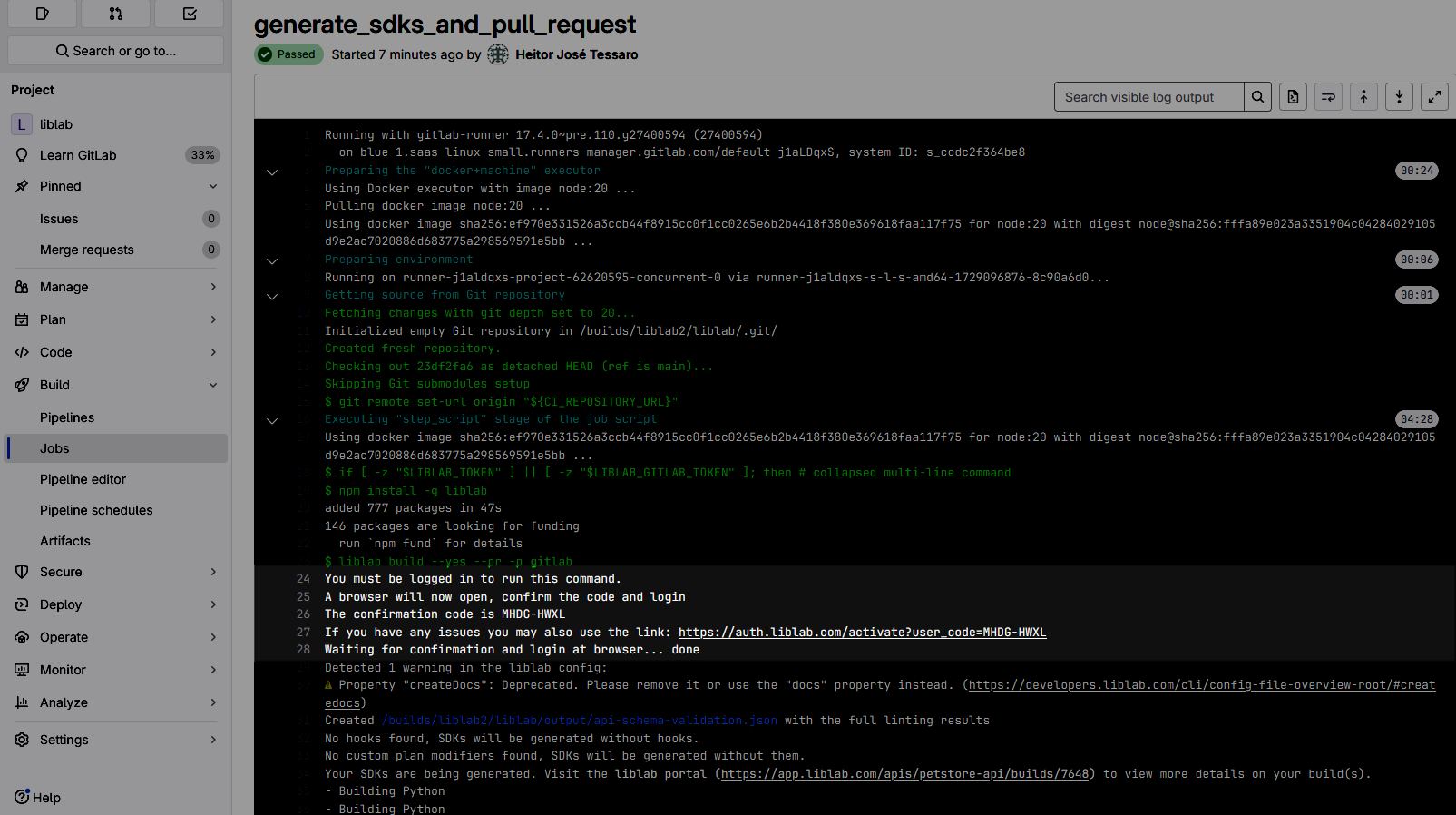
If you don't log in and confirm the code, the job may not be complete, and the SDK build will not be triggered.
Merge SDK PRs
Once the Control Repo job is completed successfully, you'll see a PR in each SDK repo.
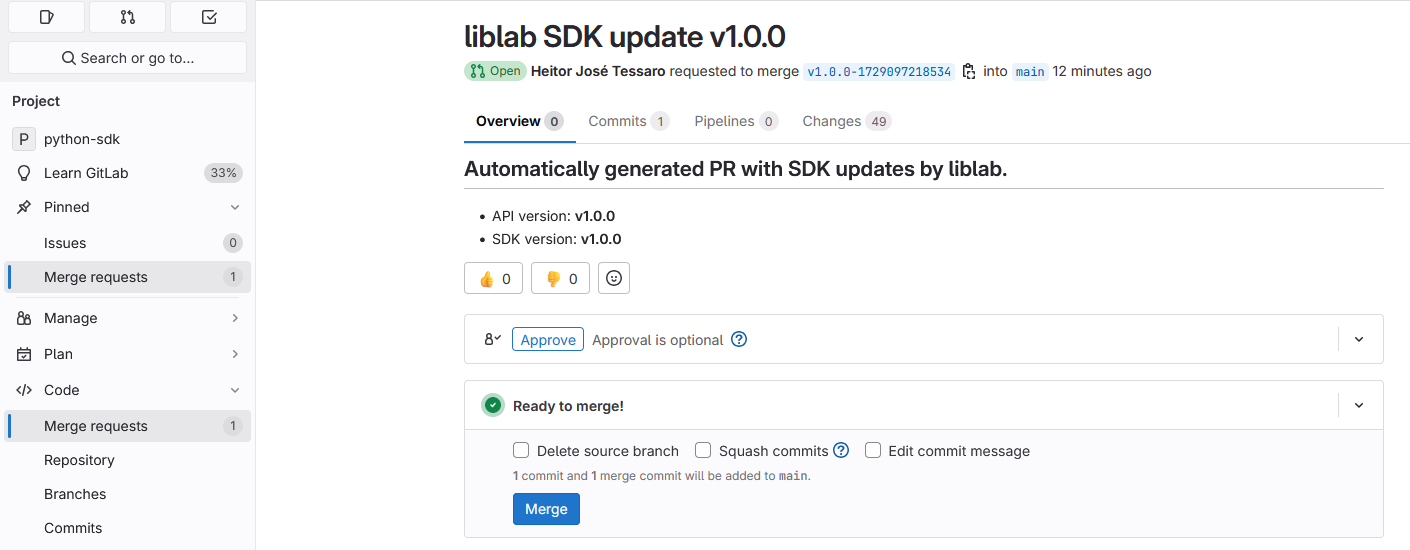
Check the PRs generated by liblab in each SDK repo, accessing Code > Merge requests.
If you don't see the PRs, check your Control Repo's CI/CD > Pipelines or Jobs section for any errors during the SDK generation process. You can also refer to the common errors section for troubleshooting.
- Review the PRs to ensure that the changes are correct.
- Once you're happy, approve and merge the PRs.
Create a release in GitLab
You need to create a release in the SDK repo to trigger the Action to publish your SDK to the package manager. To create a release, follow the steps below:
-
From each SDK repo, access Deploy > Releases and click Create a new release.
-
On the release page:
- Provide a Tag name. The tag should be a version number using semantic versioning, and it is common to prefix the version with
v, such asv1.0.0.
Note on Versioning Go PackagesIt is important to note that the release tag version will be used as the version of the package in the Go Packages repo. Therefore, it is important to follow semantic versioning and ensure that the version in the
liblab.config.jsonfile corresponds to the version of the release tag.- Give the release a Release title. The title can be the same as the tag.
- Add a Milestone. You can create one if necessary.
- Define the Release date and add the Release notes.
- Provide a Tag name. The tag should be a version number using semantic versioning, and it is common to prefix the version with
-
Click Create release. This will trigger the pipeline to publish your SDK.
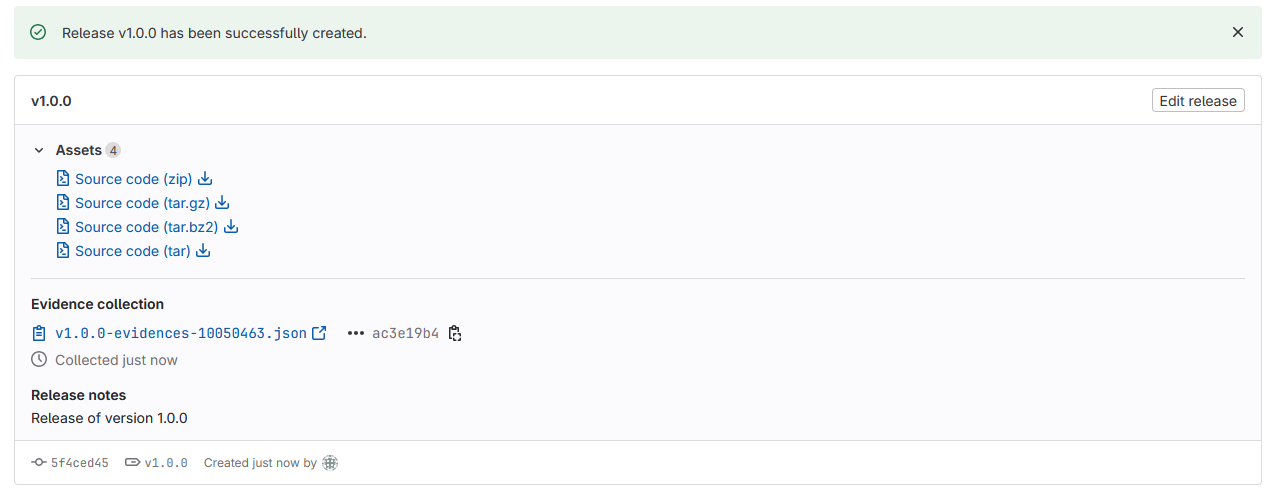
Confirm SDK publication
Once the publishing Action is done, check the package manager to confirm your SDK was published.
Your setup is now fully automated to generate and publish SDKs with liblab and GitLab CI/CD, ensuring your latest API updates are quickly available to your users.
If you don’t see the SDK in the package manager, check the CI/CD > Pipelines or Jobs section in each SDK repo to troubleshoot any errors during the publishing process.
Common errors
If your repos are not configured correctly, you may see one of the following errors:
-
If the generate SDKs Action fails with this error:
Error: Secrets LIBLAB_TOKEN and LIBLAB_GITLAB_TOKEN are requiredThen you haven't set up the
LIBLAB_TOKENorLIBLAB_GITLAB_TOKENsecrets correctly. Check that the tokens are set correctly, and that the tokens are valid.